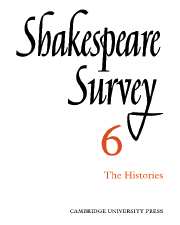Book contents
- Frontmatter
- Shakespeare's History plays: 1900-1951
- The Unity of 2 Henry IV
- Anticipation and Foreboding in Shakespeare’s Early Histories
- Middle-Class Attitudes in Shakespeare’s Histories
- A Reconsideration of Edward III
- On Producing Henry VI
- The Huntington Library
- An Early Elizabethan Playhouse
- Shakespeare Learns the Value of Money: The Dramatist at Work on Timon of Athens
- Shakespeare’s French Fruits
- An Elizabethan Eyewitness of Antony and Cleopatra?
- Othello’s “It is the cause . . .”: An Analysis
- On Translating Hamlet
- Shakespeare in China
- International Notes
- Shakespeare Productions in the United Kingdom: 1951
- Shakespeare’s History Plays - Epic or Drama?
- Festival Shakespeare in the West End
- The Year's Contributions to Shakespearian Study 1 Critical Studies
- 2 Shakespeare’s Life, Times and Stage
- 3 Textual Studies
- Books Received
- Index
- Plate Section
3 - Textual Studies
Published online by Cambridge University Press: 28 March 2007
- Frontmatter
- Shakespeare's History plays: 1900-1951
- The Unity of 2 Henry IV
- Anticipation and Foreboding in Shakespeare’s Early Histories
- Middle-Class Attitudes in Shakespeare’s Histories
- A Reconsideration of Edward III
- On Producing Henry VI
- The Huntington Library
- An Early Elizabethan Playhouse
- Shakespeare Learns the Value of Money: The Dramatist at Work on Timon of Athens
- Shakespeare’s French Fruits
- An Elizabethan Eyewitness of Antony and Cleopatra?
- Othello’s “It is the cause . . .”: An Analysis
- On Translating Hamlet
- Shakespeare in China
- International Notes
- Shakespeare Productions in the United Kingdom: 1951
- Shakespeare’s History Plays - Epic or Drama?
- Festival Shakespeare in the West End
- The Year's Contributions to Shakespearian Study 1 Critical Studies
- 2 Shakespeare’s Life, Times and Stage
- 3 Textual Studies
- Books Received
- Index
- Plate Section
Summary
Textual and bibliographical studies of Shakespeare were more numerous and more important than usual in 1951–2. The major publication of the year is surely the second volume of A Bibliography of English Printed Drama to the Restoration by Sir Walter Greg. This is one of the works for which must be reserved the adjective ‘monumental’. Of direct interest to Shakespearians are the entries relating to Othello, first printed in 1622, and the plays which were published for the first time in 1623 in the First Folio. But the Bibliography is too well known and too widely used to need praise. It is not inappropriate at this point to return thanks for the reissuing of Greg’s The Editorial Problem in Shakespeare, which has long been out of print. The second edition contains a few corrections in the text and nine pages of prefatory matter in which the author takes account of a decade of textual studies.
"Contrary to what appears to be a general opinion in universities", writes Douglas Southall Freeman in George Washington: A Biography, "it [the history of the American Revolution] is a field that should be replowed and tilled for nearly the whole of its wide area". The remark is equally applicable to the subject of the text of Shakespeare. The exact nature of the manuscripts from which Shakespeare's plays were printed in the early quartos and the First Folio is very imperfectly apprehended even "in universities". Nor is there general comprehension of the various ways in which the text of a particular play was exposed to contamination in the process of transmission from the pen of the author to the printed page. The general public may be forgiven for expressing wonder that there are certain entire plays and portions of others which we shall never recover in the exact form Shakespeare gave them in his fair copies
- Type
- Chapter
- Information
- Shakespeare Survey , pp. 163 - 172Publisher: Cambridge University PressPrint publication year: 1953



